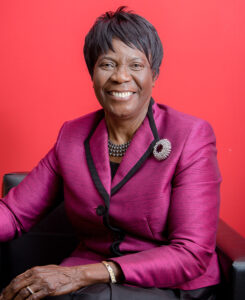Dotty Nicholas urges people with sickle cell to be vigilant against COVID-19
By Lincoln DePradine

The financial, social and health impact of the Coronavirus has been felt by many in Canada, especially Black people and those with sickle cell disease (SCD) and other pre-existing health conditions.
Retired Jamaican-born nurse Dotty Nicholas, who devoted much of her working life to serving sickle cell patients and their families, is encouraging continued vigilance against COVID-19 from people affected by SCD.
The virus and its effects are “still ravaging our community,’’ Nicholas said last Saturday at a virtual awards’ ceremony. “Therefore, sickle cell patients and their families have to remain vigilant and to keep safe and healthy. And, that’s my reason for not having an in-person award this year.’’
The awards recognized six youth by providing them with cash for college and university studies.
The presentation was hosted by the Dotty Nicholas Sickle Cell Scholarship Fund Association (DNSCSFA).
It brought to 35 the total number of DNSCSFA scholarships since the 2013 establishment of the association that is named after Nicholas, who is popularly known as “Miss Dotty’’.
She’s a founding-member of the Sickle Cell Disease Association of Canada (SCDAC) and a former president of the Sickle Cell Association of Ontario.
Nicholas, an associate pastor at Rhema Christian Ministries in Toronto, is also president of DNSCSFA.
“I just want to say thank you to Miss Dotty. Thank you to everyone who had a part in making this happen,’’ student Venus Brown commented, after receiving her scholarship award.
Other scholarship winners were Shaneia Elliott, Bright Olaleye, Amelia Samms, Obed Okito and Marcus Dove.
The first-ever scholarship, recalled Nicholas, was made possible through her own personal contribution and with “nickels, dimes and quarters’’ from friends and supporters.
The DNSCSFA awards remain dependent on fundraising and sponsorship from private citizens and public officials, including politicians and health practitioners. Some participated in last Saturday’s online event, presenting awards and congratulating the scholarship recipients.
The inauguration of the awards in 2013 “was sown in love’’, and it has done “remarkably well’’ because of the “untiring efforts’’ of many, said Nicholas, who was honoured last year with a “Lifetime Achievement Award’’ from the Sickle Cell Disease Association of Canada.
She appealed for ongoing support in efforts at trying to “improve the health, the wellness and the lifestyle of those affected with sickle cell disease. Let’s continue to work together to build a lasting relationship for the good of those affected with sickle cell disease’’.
SCD, a group of blood disorders, has the highest frequency in tropical regions such as sub-Saharan Africa and among people of African descent in the Diaspora. It leaves patients in excruciating pain during what is known as a “sickle cell crisis’’.
Marcia Palmer, a registered nurse and DNSCSFA vice president, said despite challenges posed by the COVID-19 pandemic, the scholarship recipients were “very resilient and they have overcome many things’’.
“This is a great accomplishment for them, and I see great things happening in the future for all these recipients,’’ said Palmer.
The event also featured a presentation on “Kidney Disease in Sickle Cell Patients’’, and advice on diet and other health tips on living with SCD.
“The food we eat needs to be nutritious. I highly recommend an anti-inflammatory diet. Also, meal planning is really great as well,’’ said Storma McDonald, president of the Sickle Cell Association of British Columbia.
McDonald, who was diagnosed with sickle cell at age seven, said SCD patients should know “what our sickle cell triggers are, so that we can stay healthy’’.
She recommended physical exercise and intake of water, and added also that “getting lots of rest is really important for people with sickle cell. They did a study years ago that showed that people who nap, live longer’’.
Participants at the awards’ ceremony acceded to a request from Biba Tinga, president of the SCDAC, to observe a minute’s silence “in memory of those who lost the battle against sickle cell disease’’.


